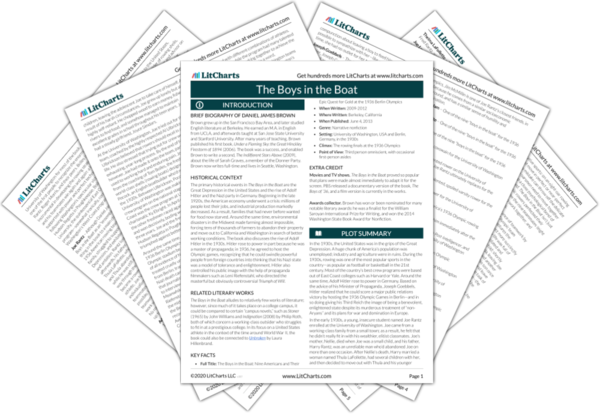Minor Characters
Leni Riefenstahl
Leni Riefenstahl was an influential director of Nazi propaganda films (including the masterful but controversial Triumph of the Will), and a close friend of Adolf Hitler. During the 1936 Olympics, she shot footage for her 1938 film Olympia, and frequently quarreled with her rival, Joseph Goebbels.
Don Hume
The “stroke” for the Washington crew team, Don Hume plays a pivotal role in his team’s success at the 1936 Olympics, even though he’s extremely ill at the time.
Shorty Hunt
An excellent rower for the University of Washington, Shorty Hunt is charismatic and talkative, but also “high-strung,” “nervous,” and easily agitated. His rowing position is the number two seat behind Joe Rantz, and he has a habit of reassuring Rantz by saying “Don’t worry, Joe. I’ve got your back.”
Jim McMillin
One of the nine “boys in the boat” for the 1936 Olympics, Jim McMillin is one of Joe Rantz’s closest friends, in part because he comes from a similar socioeconomic background, and has a similar sense of humility and determination.
Gordy Adam
One of the nine “boys in the boat” for the 1936 Olympics.
Johnny White
One of the nine “boys in the boat” for the 1936 Olympics.
Chuck Day
One of the nine “boys in the boat” for the 1936 Olympics.
George Morry
A coxswain for the University of Washington crew team.
Merton Hatch
A talented rower on the University of Washington team, who Joe Rantz ultimately replaces for the 1936 varsity team.
Broussais C. Beck Jr.
A talented, spoiled varsity rower for the University of Washington.
Bob Green
A sophomore rower for the University of Washington.
Don Coy
The alternate for America’s 1936 Olympic rowing team.
Alma
Joe Rantz’s aunt, who raises him immediately after the death of his mother, Nellie Maxwell.
Royal Brougham
Sports editor for the Post-Intelligencer, and an important factor in turning the University of Washington crew team into a national sensation.
Avery Brundage
President of the American Olympic Committee, and possibly an anti-Semite.
Russell Callow
Crew coach at the University of Washington during the early 1920s.
Hiram Conibear
The rowing coach for the University of Washington in the early 1910s.
Paul Coughlin
The head of the University of Washington alumni association.
John Noel Duckworth
Coxswain for Britain’s 1936 Olympic rowing team.
William George Ranald Mundell Laurie
Stroke for Britain’s 1936 Olympic rowing team.
Hermann Göring
A powerful official in Adolf Hitler’s Third Reich, and the official Marshal of the Reichstag (effectively making him second in command to Hitler himself).
Eleanor Holm
A gold medalist in swimming, who was banned from the 1936 Olympic games for heavy drinking.
Fritz Kreisler
A famous West Coast violinist.
Fred Rantz
The older brother of Joe Rantz, Fred Rantz shares many personal qualities with Joe: especially his ambition and drive.
Thelma LaFollette
The wife (and, technically, step-aunt) of Fred Rantz, and the sister of Thula LaFollette.
Joe Louis
Acclaimed African American boxer who defended his heavyweight title for more than a decade between the 1930s and 1940s.
Werner March
German architect who helped designed the 1936 Olympic stadium.
Nellie Maxwell
The mother of Joe Rantz and the first wife of Harry Rantz, Nellie dies of throat cancer while Joe is still a young child.
Charlie McDonald
An older neighbor of Joe Rantz during Joe’s lonely years of supporting himself, and one of Joe’s few friends.
Jesse Owens
Perhaps the most famous athlete who competed in the 1936 Olympic games, Jesse Owens was an African American track star whose success in Berlin defied the Nazis’ racist theories about Aryan superiority.
Dick Pocock
Brother of George Yeoman Pocock.
Harry Rantz Junior
The child of Harry Rantz and Thula LaFollette.
Judy Rantz
Joe Rantz’s beloved daughter.
Franklin Delano Roosevelt
Thirty-second president of the United States, who presided over the country for most of the Great Depression and World War Two.
Franklin Roosevelt Junior
Son of Franklin Delano Roosevelt.
Max Schmeling
The world heavyweight boxing champion, who defeated Joe Louis in 1936, but later lost decisively to Louis.
Harry Secor
A friend of Joe Rantz.
